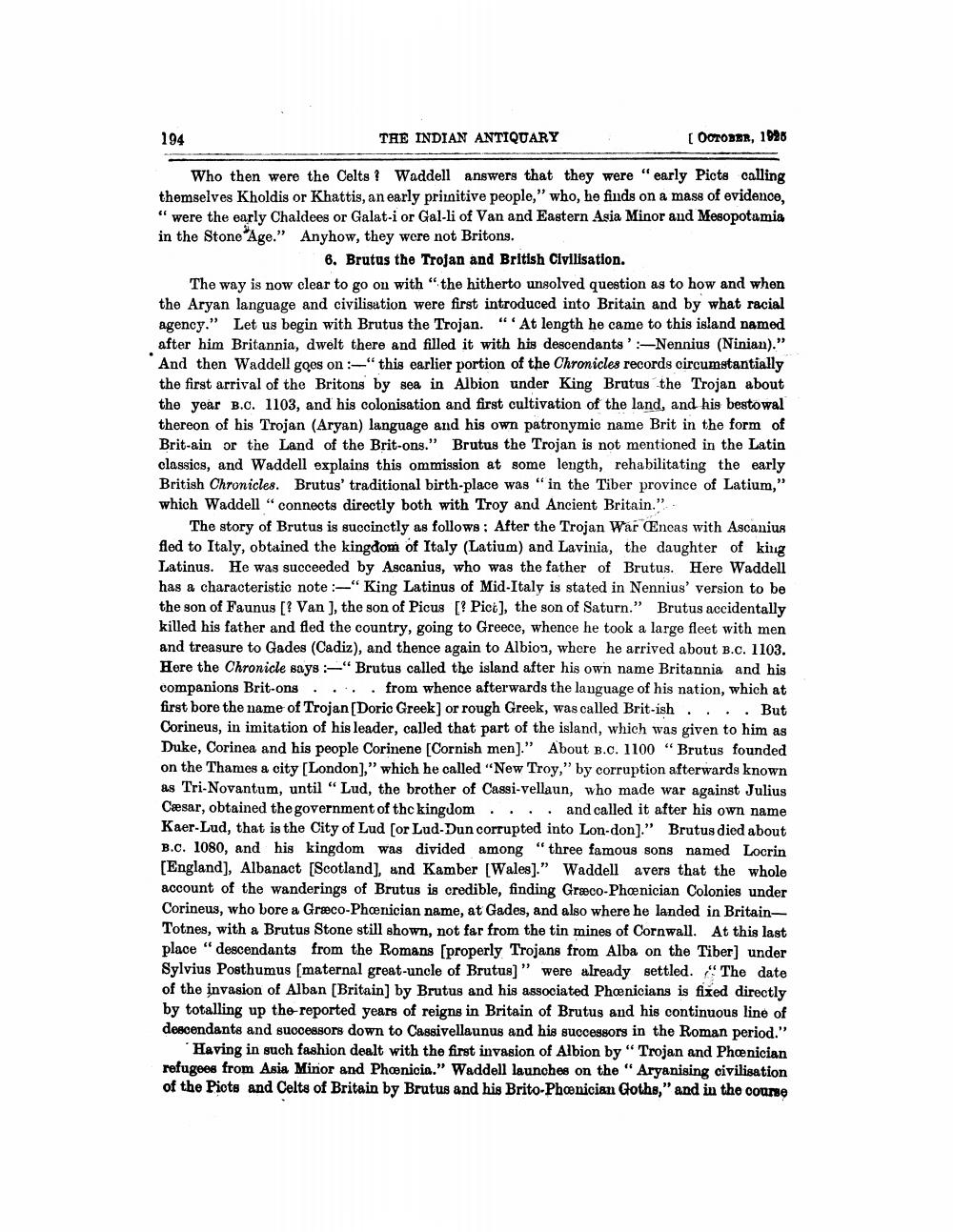________________
194
THE INDIAN ANTIQUARY
""
[ OCTOBER, 1925
Who then were the Celts? Waddell answers that they were 'early Picts calling themselves Kholdis or Khattis, an early primitive people," who, he finds on a mass of evidence, "were the early Chaldees or Galat-i or Gal-li of Van and Eastern Asia Minor and Mesopotamia in the Stone Age." Anyhow, they were not Britons.
6. Brutus the Trojan and British Civilisation.
The way is now clear to go on with "the hitherto unsolved question as to how and when the Aryan language and civilisation were first introduced into Britain and by what racial agency." Let us begin with Brutus the Trojan. "At length he came to this island named after him Britannia, dwelt there and filled it with his descendants':-Nennius (Ninian)." And then Waddell goes on:-"this earlier portion of the Chronicles records circumstantially the first arrival of the Britons by sea in Albion under King Brutus the Trojan about the year B.C. 1103, and his colonisation and first cultivation of the land, and his bestowal thereon of his Trojan (Aryan) language and his own patronymic name Brit in the form of Brit-ain or the Land of the Brit-ons." Brutus the Trojan is not mentioned in the Latin classics, and Waddell explains this ommission at some length, rehabilitating the early British Chronicles. Brutus' traditional birth-place was "in the Tiber province of Latium," which Waddell "connects directly both with Troy and Ancient Britain."
The story of Brutus is succinctly as follows: After the Trojan War Encas with Ascanius fled to Italy, obtained the kingdom of Italy (Latium) and Lavinia, the daughter of king Latinus. He was succeeded by Ascanius, who was the father of Brutus. Here Waddell has a characteristic note:-" King Latinus of Mid-Italy is stated in Nennius' version to be the son of Faunus [? Van ], the son of Picus [? Pict], the son of Saturn." Brutus accidentally killed his father and fled the country, going to Greece, whence he took a large fleet with men and treasure to Gades (Cadiz), and thence again to Albion, where he arrived about B.C. 1103. Here the Chronicle says:-"Brutus called the island after his own name Britannia and his companions Brit-ons . from whence afterwards the language of his nation, which at first bore the name of Trojan [Doric Greek] or rough Greek, was called Brit-ish . . . . But Corineus, in imitation of his leader, called that part of the island, which was given to him as Duke, Corinea and his people Corinene [Cornish men]." About B.c. 1100 "Brutus founded on the Thames a city [London]," which he called "New Troy," by corruption afterwards known as Tri-Novantum, until "Lud, the brother of Cassi-vellaun, who made war against Julius Cæsar, obtained the government of the kingdom.... and called it after his own name Kaer-Lud, that is the City of Lud [or Lud-Dun corrupted into Lon-don]." Brutus died about B.C. 1080, and his kingdom was divided among "three famous sons named Locrin [England], Albanact [Scotland], and Kamber [Wales]." Waddell avers that the whole account of the wanderings of Brutus is credible, finding Græco-Phoenician Colonies under Corineus, who bore a Græco-Phoenician name, at Gades, and also where he landed in BritainTotnes, with a Brutus Stone still shown, not far from the tin mines of Cornwall. At this last place "descendants from the Romans [properly Trojans from Alba on the Tiber] under Sylvius Posthumus [maternal great-uncle of Brutus]" were already settled. The date of the invasion of Alban [Britain] by Brutus and his associated Phoenicians is fixed directly by totalling up the reported years of reigns in Britain of Brutus and his continuous line of descendants and successors down to Cassivellaunus and his successors in the Roman period."
Having in such fashion dealt with the first invasion of Albion by "Trojan and Phoenician refugees from Asia Minor and Phoenicia." Waddell launches on the "Aryanising civilisation of the Picts and Celts of Britain by Brutus and his Brito-Phoenician Goths," and in the course




